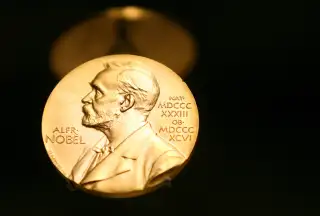What a Nobel Prize Is Worth

International prestige, a hefty gold medal, and a check for close to $1 million: that's what you get if you win a Nobel Prize.
This year’s prize is worth 8 million Swedish kronor, around $970,000. That’s a slight increase from the past two years, though much less than the amount awarded from 2000-2011, when it fluctuated between 10 million and 11.7 million kronor (the latter in 2001, the prize’s 100th anniversary), the largest prize amount in the award’s history.
But the money bestowed with the honor is hardly the only way to profit from becoming a Nobel laureate.
Last year, James Watson, one of the three people awarded the Nobel Prize in 1962 for the discovery of DNA’s double helix structure, auctioned his Nobel medal for $4.7 million to a Russian billionaire (who gave the gold back to the beleaguered scientist). The biologist fell on hard times after telling the UK’s Sunday Times in 2007 that he felt “inherently gloomy about the prospect of Africa” because “all our social policies are based on the fact that their intelligence is the same as ours—whereas all the testing says not really.”
After the quote was published, Watson was kicked off of all of the company boards on which he served, and various speeches and appearances were cancelled amid the backlash. As Al Jazeera America details, even seven years later, his reputation—and bank account—hadn’t recovered. Auctioning his medal was a last-ditch effort for some extra income (and perhaps a little extra attention).
The only other living Nobel laureate to auction a medal is Leon Lederman, who won a share of the physics prize in 1988 for the codiscovery of the subatomic particle muon neutrino. Lederman suffers from dementia and needed the money to pay for hospital bills, his wife Ellen Lederman told the AP. His gold sold for $765,002 in an online auction earlier this year.
Lederman’s auction price ranks fourth on the list of most profitable Nobel sales, according to NBC News. Watson’s $4.7 million bounty takes the top spot, while his physicist colleague Francis Crick's award sits at number two after it was sold for more than $2 million in 2013. Last year, a private collector auctioned Argentine scholar Carlos Saavedra Lamas 1936 Nobel Peace Prize for $1.1 million.
And auctioning off the medals may be becoming a trend: In July, the prize awarded to Hans Krebs for the discovery of the citric acid cycle hammered for $425,535 at Sotheby’s.
Beyond that, while the prize money isn't enough for retirement, many Nobel laureates can use the cachet that comes with being a recipient as a means to give talks, sit on company boards, or write books. Many are also approached by private businesses and organizations to work as consultants or full-time employees—though for most the money isn't the point.
"Most scientists who do Nobel-quality work do not get into the game to get rich," Daniel Kelves, a professor of history and medicine at Yale, told Live Science in 2010. Rather, he said, it's the ability to work with other high-profile professionals and draw attention to the fields they've dedicated their lives to that is the true reward.
Read Next: How the MacArthur Geniuses Should Manage Their Money